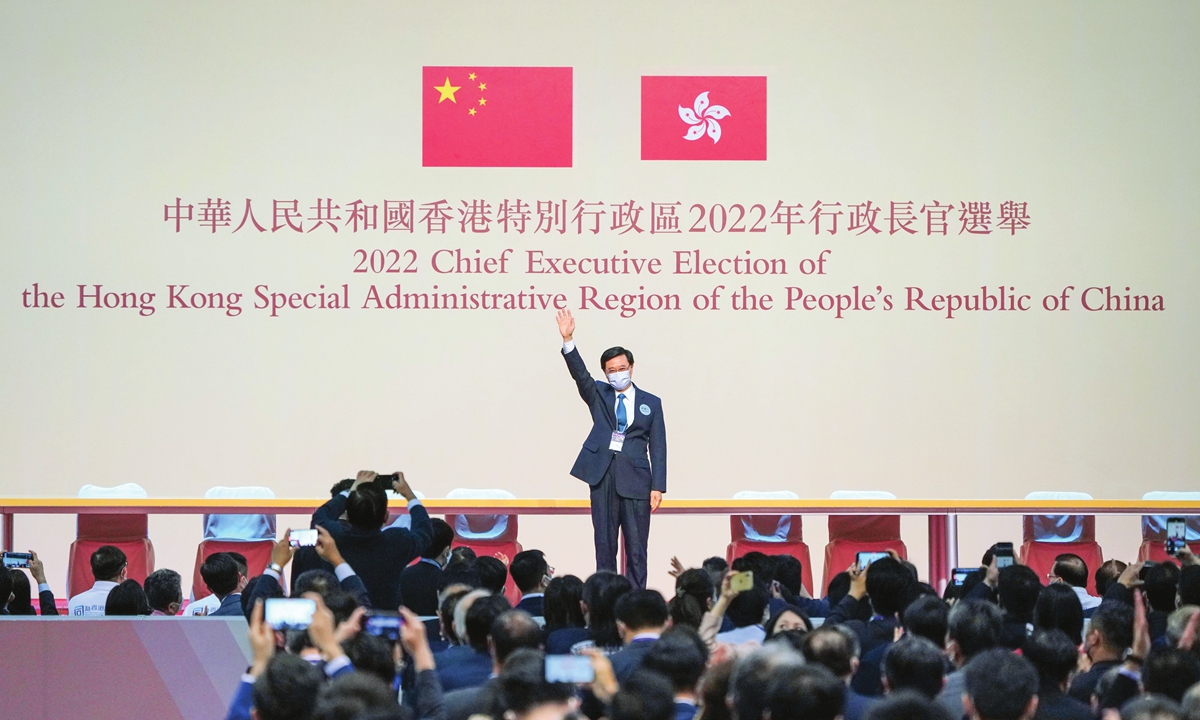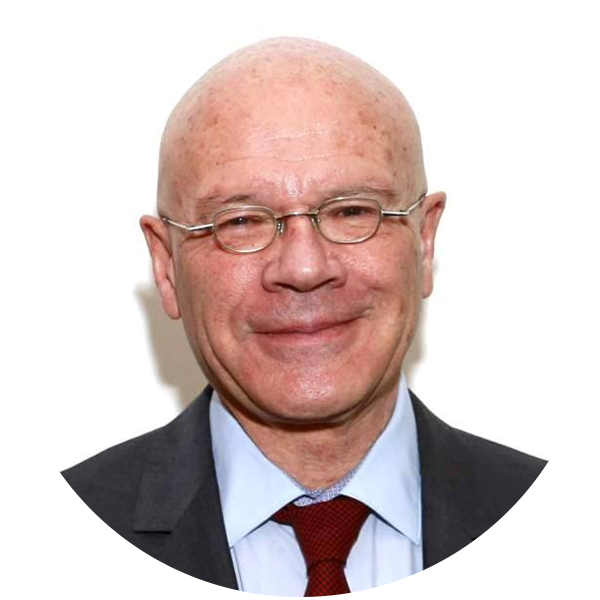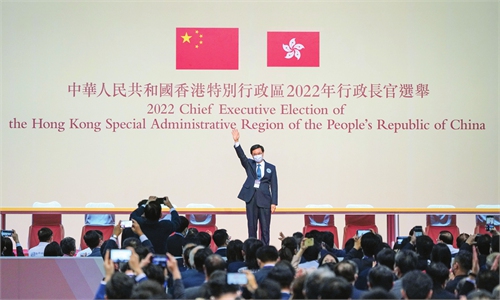
John Lee waves to people after winning the election of the sixth-term chief executive of the Hong Kong Special Administrative Region on May 8, 2022. Photo: cnsphoto
If the central priority in Hong Kong in 2020 was to restore order and stability, the main task now confronting the Hong Kong Special Administrative Region government is winning the support of the Hong Kong people. This is not an easy task. Ever since the handover, there has been grudging, but never enthusiastic, support for the government. I was present at the handover of both Hong Kong in 1997 and Macau in 1999 and the contrast was telling. While there was little evidence of popular support on the streets in Hong Kong, in Macau many thousands turned out to greet the arrival of the PLA. By 2014 there was growing dissatisfaction about the state of affairs in Hong Kong that culminated in the riots in 2019 and was exacerbated by Western interference. That year was to mark the end of One Country Two Systems Mark 1. It was no longer sustainable.
The primary reason for the disillusionment was socio-economic: rocketing property prices, a chronic shortage of homes, and an old colonial-style oligopolistic economy which generated huge inequality and little innovation. Between 1997 and 2019, the government had failed to tackle these fundamental problems. No serious break was made with the legacy of the colonial era: on the contrary, little changed, the status quo largely prevailed. This was further exacerbated by the legacy of Hong Kong's colonial history. After 156 years of British colonialism, Hongkongers habitually looked West, not north. Many liked the idea of being Western at a time when the West still enjoyed considerable status and prestige. Hongkongers had a split identity, part Chinese, part Western. That is why many had somewhat mixed feelings about the handover.
There is no simple solution to the latter. History is history: 156 years is a very long time. Any meaningful solution to this problem will require the passage of time, the creation of a newly successful Hong Kong that people can identify with and take ownership of, combined with patient, persuasive statecraft on the part of the Hong Kong government and the Chinese government. The socio-economic problem, though, is a different matter. This demands urgent attention and a major shift in strategy and thinking by the Hong Kong authorities.
One Country Two Systems Mark 2, as I would describe it, should comprise three key features. First, a new unity based on an unambiguous acceptance of Chinese sovereignty. This is not new, it was a fundamental to One Country Two Systems Mark I, but it was constantly challenged and contested both within Hong Kong and by Western politicians and media. There can be no further ambiguity. Second, Hong Kong's future depends on a much closer relationship with the Chinese mainland in a whole host of different ways, including, most importantly of all, the Greater Bay Area. Carrie Lam's Northern Metropolis project near the border with Shenzhen is a most welcome development in this context. The center of gravity of Hong Kong needs to shift northward.
Third, an ambitious program of socio-economic reform that can transform Hong Kong in a manner similar to China's own reform program. Of course, Hong Kong is in crucial respects very different from China and any program must reflect this. The central thrust for Hong Kong must be what I would describe as the modernisation and decolonisation of Hong Kong in terms of its economic structure and its administrative system. The control exercised by a handful of tycoons over the supply of land must be ended. A huge program of residential construction is a prerequisite. Together these offer the prospect of cheaper housing and a plentiful supply of homes, the lack of which is perhaps the biggest grievance of ordinary Hongkongers. Far from Hong Kong having an inclusive society, it is in fact one of the most unequal in the world. If Chinese mainland can abolish extreme poverty, Hong Kong can and should be expected to do no less. The anger and alienation revealed by the riots came overwhelmingly from the young who felt Hong Kong offered them little in the way of hope in terms of jobs, education, and housing. Winning the young is the most important task facing the government. It is encouraging that John Lee, the new chief executive, has embraced many of the above points in his initial statements.
The problem with One Country Two Systems Mark I was its failure to address the legacy of British colonialism, and its acquiescence in a status quo that was clearly failing the majority of the people. Mark 2 must be very different. A program of reform in housing, land supply, education, and training, combined with an assault on poverty and inequality can stimulate a new sense of optimism in Hong Kong and begin the process of winning the hearts and minds of the people. Mark 1 did not succeed in this endeavour. This must be the central objective of Mark 2.
The author was until recently a senior fellow at the Department of Politics and International Studies at Cambridge University. He is a visiting professor at the Institute of Modern International Relations at Tsinghua University and a senior fellow at the China Institute, Fudan University. Follow him on twitter @martjacques. opinion@globaltimes.com.cn



